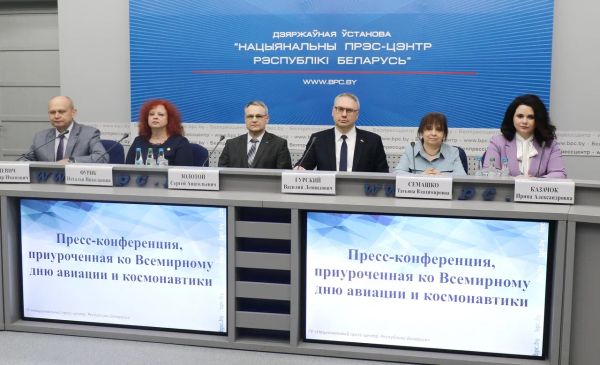

On April 10, 2024, a press conference was held on the World Aviation and Cosmonautics Day at the National Press Center of the Republic of Belarus. The press conference was attended by: Vasily Gursky, Chief Scientific Secretary of the NAS of Belarus; Sergey Zolotoy, Director of the Geoinformation Systems Company of the NAS of Belarus; Natalia Furik, First Deputy Director for Scientific Work of the Institute of Meat and Dairy Industry; Alexander Budevich, Deputy Director General for Scientific Work of the Scientific and Practical Center on Livestock; Tatyana Semashko, Deputy Director for Scientific and Innovative Work at the Institute of Microbiology, and Irina Kazachok, a leading specialist in the Department of Space Activities of the Apparatus of the NAS of Belarus.
During the press event, scientists of the Academy of Sciences presented the achievements of Belarus in the field of space technologies, told about the development of a scientific program and experiments during the flight of the first cosmonaut of the Republic of Belarus Marina Vasilevskaya to the ISS, the results of the flight and much more.
As Vasily Gursky stressed at the press conference, the flight of a Belarusian citizen into space is not an accidental or spontaneous success. It is the result of a large, long-term and purposeful work of a large number of people. "First of all, it should be noted that the development of the Belarusian space program is an initiative of President Alexander Grigoryevich Lukashenko. Thanks to his support, all space activities in our country are developing," Vasily Gursky stressed.
Sergey Zolotoy, Director of the Geoinformation Systems Company of the NAS of Belarus, spoke at a press conference about the development of small spacecraft and the creation of groups consisting of them. According to him, Belarus, together with Russia, is implementing the union program Complex-US, within the framework of which a group of small spacecraft is being created. "Russia makes two devices, Belarus makes one. These are spacecraft weighing 10 kg. There is a more serious device that weighs about 50 kg. This group will solve tasks related, among other things, to remote sensing of the Earth," he stressed. Natalia Furik, Deputy Director for Scientific Work at the Institute of Meat and Dairy Industry, told about the work of scientists on the creation of a complex fermented milk product to maintain the human microbiota in space flight. Tatyana Semashko, Deputy Director for Scientific and Innovative Work at the Institute of Microbiology of the NAS of Belarus, informed media representatives that Belarusian cosmonaut Marina Vasilevskaya had selected samples of microorganisms on the International Space Station for their study by Belarusian scientists. Alexander Budevich, Deputy Director General for Scientific Work of the Scientific and Practical Center of the NAS of Belarus on Livestock, spoke about the experiment on a valuable protein, lactoferrin. Irina Kazachok, a leading specialist in the Department of Space Activities of the Apparatus of the NAS of Belarus, elaborated on the Belarusian history of the conquest of space.
At the end of the press conference, the scientists answered numerous questions from journalists.